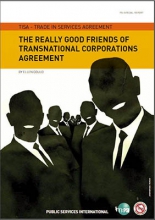PSI Special Report: The Really Good Friends of Transnational Corporations Agreement

This new report on trade, written by Ellen Gould, was launched by PSI and Our World is not For Sale (OWINFS) at a Global Trade Summit in Washington, D.C., on 15-17 September 2014.
Highly secretive talks began in 2012 to establish a new trade agreement, the Trade in Services Agreement (TISA). The group of countries negotiating TISA have given themselves an insider joke for a name: the 'Really Good Friends of Services', to signal how truly committed they are to promoting the interests of services corporations. But there is nothing funny about the sweeping, permanent restrictions on public services and regulation that could be the impact of their work.
Eliminating government's role in the delivery of services, getting rid of regulations, and allowing transnational corporations free rein sounds like the platform of a libertarian political party, a radical agenda that should be debated in public and that voters should have a say over at the ballot box. Instead, the Really Good Friends of Services have imposed unprecedented levels of secrecy on their negotiations, suppressing the public's ability to discuss the serious issues at stake. The positions TISA governments take at the bargaining table - how much they push privatisation and deregulation, whether they make concessions in sensitive areas like health, education, culture, water supply, and banking regulation - will not be made public until five years after the agreement comes into force.
This extreme secrecy seems designed so that trade officials can negotiate without regard to domestic concerns and to relieve politicians of any accountability for their role in creating TISA.
Why are transnational corporations confident they can get their agenda of deregulation and privatisation through TISA? This report focuses on how TISA could be used to accomplish their deregulatory agenda, and is meant to complement the study 'TISA versus Public Services' that examines how TISA would foster privatisation.
The objective of this report is to help overcome the secrecy and complexity surrounding the TISA negotiations in order to bring the agreement into the public sphere for democratic debate.
For more information:
- Download a PDF of the report in English - French - Spanish - German - Russian
- Read the report on-line: English - Spanish - French - German
- See PSI’s action on TISA

